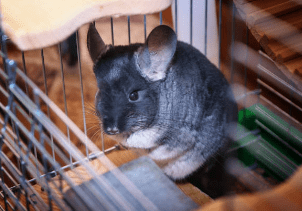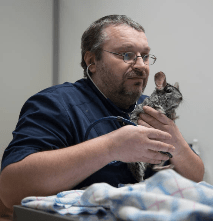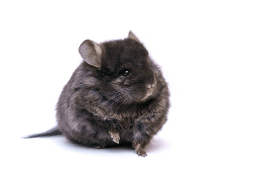The allure of the black chinchilla or its plush variant, the black velvet chinchilla, can leave one spellbound.
And let’s be honest, their luxurious appearance has spiked the black chinchilla price up a bit.
But what makes these fluffy creatures truly fascinating?
Come with me as we embark on this exploratory journey and dive into the tantalizing world of black chinchillas.
Table of Contents
Unique Characteristics and Appearance
Chinchillas black, with their distinct appearance, carry a certain mystique that has fascinated many over the years. Chinchilla’s black color, and deep, luxurious coat sets them apart, not just visually but also in the rich tapestry of their history and genetics.
Historical Significance and Popularity
Historically, chinchilla black fur has been cherished for its softness, but the rare black variety has always held a special place of reverence. In various cultures, the black chinchilla was seen as a symbol of opulence and exclusivity, leading to its high demand and, consequently, a surge in popularity.
This increased demand, combined with their rarity, made them even more sought-after, giving them an almost legendary status among chinchilla enthusiasts and furriers alike.
Genetics and Inheritance of Black Coat Color
The alluring black coat of these chinchillas isn’t just a result of chance. It’s deeply rooted in their genetics. Color inheritance is predominantly based on a combination of dominant and recessive genes. For the rich, uniform black shade, specific gene combinations are required.
When two chinchillas carrying the black color gene mate, there’s a higher probability of their offspring inheriting this coveted coloration. However, breeding for this specific color should be approached responsibly, ensuring the health and well-being of the animals always remain paramount.
Caring for Black Chinchillas
Black chinchillas, with their dark, luxurious fur, might appear as creatures demanding elite care. And to some extent, they do crave specific attention. Their care is an amalgamation of the right habitat, optimum nutrition, and meticulous grooming.
Creating a Suitable Habitat for Black Chinchillas
Chinchillas, irrespective of color, are mountainous creatures by origin. Hence, their habitat needs to mirror the cool, dry conditions of their native Andes.
A spacious cage with good ventilation, multiple levels, and wooden platforms will mimic their natural playgrounds. The placement should avoid direct sunlight, ensuring a consistently cool ambiance for the black beauty.

Providing Optimal Nutrition and Diet
Nutrition is pivotal. A diet rich in hay, supplemented by high-quality chinchilla pellets, ensures they get essential nutrients. Freshwater, replenished daily, along with occasional treats like dried fruits, keeps them sprightly.
Maintaining Proper Hygiene and Grooming
Their thick fur is a trap for dust and needs regular upkeep. Dust baths, a couple of times a week, let them cleanse themselves, maintaining the luster of their coat. All black chinchilla
should be keeping their living space clean further guarantees they remain the picture of health and elegance.
Health Considerations for Black Chinchillas
Black chinchillas, with their mesmerizing coats, aren’t just visually distinct; they also have specific health needs that require keen observation and care.
While many of their health concerns align with chinchillas of other colors, understanding these intricacies can be the difference between a thriving pet and one that’s always under the weather.
Common Health Issues in Black Chinchillas
Every chinchilla owner must be informed of potential health concerns. Being proactive and catching symptoms early ensures a happier, healthier pet.
Dental Problems
Chinchillas’ teeth grow continuously. If they don’t have appropriate items to chew, their teeth can overgrow, leading to eating difficulties and pain.
Respiratory Infections
Cold drafts, excessive humidity, or unsanitary conditions can cause respiratory issues in black chinchillas, resulting in symptoms like wheezing or nasal discharge.
Gastrointestinal Disorders
An imbalanced diet, particularly one low in fiber or high in fat, can upset a chinchilla’s sensitive stomach, leading to bloating or constipation.
Fur Chewing or Self-Mutilation
Stress, boredom, or environmental factors can lead to chinchillas chewing their fur. This behavior can be a sign of underlying issues that need to be addressed.
Parasites
Just like other pets, chinchillas can be infested by external parasites like mites or fleas. Regular grooming and cleanliness are essential to prevent such infestations.
Heat Stroke
Chinchillas are sensitive to heat. High temperatures, especially above 80°F (27°C), can be lethal, making it essential to keep their living area cool and well-ventilated.
Regular Veterinary Care and Check-ups
Routine veterinary visits are non-negotiable. These regular check-ups can catch potential issues before they escalate, ensuring that your chinchilla remains in peak health.

Preventive Measures for Optimal Health
Consistent preventive care is the cornerstone of chinchilla health. This encompasses a balanced diet, a clean habitat, ample mental stimulation, and swift action at the first sign of health concerns.
Remember, with chinchillas, an ounce of prevention truly is worth a pound of cure.
The Beauty of Black Chinchillas as Pets
The mesmerizing allure of black chinchillas extends beyond their velvety coats. These creatures, with their vibrant personalities and opulent appearance, offer an unrivaled pet experience, making every moment spent with them truly magical.
Bonding and Building Trust with Black Chinchillas
Bonding with these fluffs is a journey of patience and love. Gentle handling, soft-spoken words, and lots of playtime forge trust. Over time, these nocturnal wonders become familiar with your voice and touch, evolving into affectionate, cuddly companions that seek your attention.
Black Chinchillas in Show Competitions and Exhibitions
Their stunning fur, paired with their dynamic personalities, make black chinchillas stand out in pet shows and exhibitions. A well-groomed black chinchilla is often the star, drawing admiration and garnering accolades, a testament to their unmatched beauty.
The Joy and Rewards of Owning a Black Chinchilla
Owning a black chinchilla is akin to having a slice of the night sky at home. Their curious antics, playful demeanor, and the softness of their fur under your fingers make every day a rewarding experience.
They’re not just pets; they’re heartwarming companions that enrich lives with joy and serenity.
Enriching the Lives of Black Chinchillas
Black chinchillas, like all their colorful counterparts, thrive when provided with an environment that caters to their unique needs. More than just a basic living space, chinchillas seek stimulation, safety, and sociability to lead fulfilling lives.
Providing Mental and Physical Stimulation
Chinchillas are naturally curious and active creatures. To keep their minds sharp and bodies agile, they need consistent challenges and physical activity. Toys, like chew sticks, mazes, and exercise wheels, can prevent boredom and offer essential dental benefits.
Climbing structures and ledges in their habitats can emulate their natural mountainous habitats, encouraging exploration and play.
Creating a Chinchilla-Friendly Environment
A chinchilla-friendly environment is a balanced mix of safety and stimulation. Soft bedding, proper ventilation, and consistent temperatures below 75°F (24°C) are vital.
Dust baths, essential for maintaining their luxurious fur, should be provided several times a week. Moreover, their enclosure should be placed away from direct sunlight and loud noises to reduce stress and ensure comfort.
Social Interaction and Bonding
While chinchillas are social animals, they also have specific social requirements. Introducing new chinchillas should be done with caution and patience, ensuring compatibility and reducing territorial disputes.
Human interaction, in the form of gentle handling and talking, can also strengthen the bond between the pet and the owner. Regular playtime outside their cage, under supervision, can provide additional interaction opportunities and enrich their daily routines.
Breeding and Genetics of Black Chinchillas
Breeding black chinchillas presents a fascinating blend of art and science. The majestic hue of their coat is not just a trait but a tale woven into their DNA. When diving into the realm of breeding these beauties, a deep understanding of genetics and ethics becomes indispensable.
Understanding the Inheritance of Black Coat Color
The enigmatic black in chinchillas arises from a complex genetic interplay. The color is the outcome of specific gene combinations which, when inherited from both parents, manifest as the exquisite black velvet or the equally enchanting all-black chinchilla.
While genetics can be intricate, knowing the lineage and genetic makeup of breeding pairs is paramount to predicting the color outcomes in offspring.
Responsible Breeding Practices
With great power comes great responsibility. Breeding, especially with creatures as delicate as chinchillas, mandates a commitment to ethics.
Ensuring genetic diversity, avoiding inbreeding, and prioritizing health over coat color are non-negotiable principles. Responsible breeders also ensure that every offspring, regardless of its coat color, finds a loving home.
Breeding for Healthy and High-Quality Black Chinchillas
The allure of the black coat shouldn’t overshadow the chinchilla’s health. Top breeders prioritize genetic health screenings, regular veterinary check-ups, and optimal nutrition to ensure the chinchillas they breed are not only beautiful but also robust and vivacious.
After all, a gleaming black coat is most mesmerizing when draped over a spirited and hearty chinchilla.
Conclusion
Embarking on the journey of understanding and caring for black chinchillas reveals their majesty and mystery. They’re not just pets; they’re a testament to nature’s brilliance, deserving all our love and care.
After all, in the world of pets, few can match the allure of an all-black chinchilla.
FAQs
How rare are black chinchillas?
All black chinchillas, especially the all-black variety, are relatively rare compared to standard grey chinchillas.
Are black chinchillas more expensive?
Due to their rarity and distinctive coat, black chinchilla prices often command higher prices than their lighter-colored counterparts.
Do black chinchillas require special care?
While their basic care is similar to other chinchillas, they may need specific attention concerning their coat’s maintenance and health considerations.
Alina Hartley is a small-town girl with a ginormous love of bearded dragons. It all started with Winchester, a baby bearded who was abandoned at the shelter by his former owners because of a birth defect that caused one front leg to be shorter than the other. Alina originally went to the shelter looking for a guinea pig, but one look at Winchester and it was love at first sight. From that day on, Alina has dedicated her life to learning everything she can about bearded dragons. She loves helping new beardie parents start their incredible journey with these magnificent reptiles.
Follow her on:
LINKEDIN
TWITTER.
Read her latest articles HERE
Learn more about her HERE.

